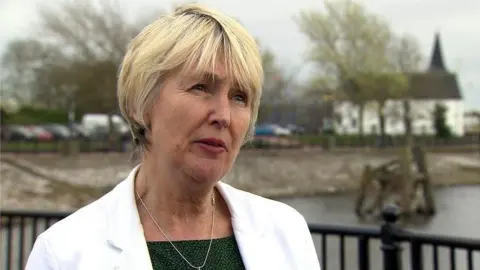Senedd rules stop politicians defending themselves says MS
 BBC
BBCThe rules that dictate how Senedd members should behave prevent politicians from defending themselves against unfounded allegations, according to a senior Plaid Cymru Senedd member.
Siân Gwenllian was found to have broken the code of conduct after she passed on parts of a confidential letter which showed that a complaint against her had been dismissed.
The MS for Arfon told the Senedd that Welsh Parliament politicians have "no right" to defend their reputations against complaints about their behaviour by sharing "relevant information".
The chair of the standards committee, Hannah Blythyn, said the committee was committed to helping to strengthening processes in place.
In a report published last week, the committee recommended that no action be taken against the Plaid Cymru politician for the code of conduct breach.
At the centre of the row was a rejected complaint of a cover-up over allegations against Rhys ab Owen, which Gwenllian had been involved in handling internally when she was Plaid Cymru chief whip.
Ab Owen was banned from the Senedd for six weeks, and expelled by Plaid, for inappropriately touching and swearing at two women while drunk on a night out.
How Plaid Cymru dealt with the original allegation was criticised by the standards commissioner Douglas Bain last year.
He said there was a lack of clear procedure and criticised the fact that the complainant's phone number was given to the now independent MS, who used it to apologise.
But in a letter to the individual claiming a cover-up by Gwenllian, Bain declared the complaint inadmissible, saying he had found "no evidence" of such a thing.
Gwenllian was found last week to have broken the Senedd's members' code of conduct, after she shared extracts from the confidential letter, which she had been given a copy of.
News website Nation.Cymru reported the claims last August. When asked to comment by its journalist, Gwenllian co-ordinated a response with the Plaid Cymru press team, requesting that an extract of the letter be provided.
It was hoped that providing the extract would stop publication. Nation.Cymru included the passages when it published its article.
An acting commissioner, Dr Melissa McCullough, was brought in to adjudicate a further complaint about the release of the confidential details.
She found that Gwenllian had broke the code of conduct by releasing the paragraphs, but was "reasonably defending herself".
She said members can "find themselves obligated" by the Senedd's code of conduct "to remain silent in response to complainant-led public allegations, some of which may have already been assessed and deemed inadmissible by the commissioner".
In the Senedd on Wednesday, Gwenllian called for the code of conduct to change, describing the situation as "morally unacceptable".
She said: "As the code currently stands, Senedd members have no right to defend their reputations by sharing relevant information when that reputation is maligned.
"When the standards commissioner dismisses completely unfounded allegations, the code prevents members from defending themselves - even if those same allegations are at risk of resurfacing."
The standards committee of the Senedd has agreed to look at the rules again.
In the Senedd Blythyn reminded MSs "of the specific need to respect confidential markings on documents, as well as the importance of maintaining confidentiality when it comes to the complaints process more generally".
But she added: "The committee agreed with the acting commissioner that there is a need for balance between confidentiality and the ability of a member to defend themselves against allegations, particularly once a complaint process is complete."
Senedd members backed the report of the committee, and its recommendation that no action be taken.
